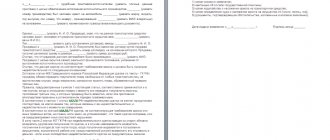Administrative arrest is one of the types of punishment provided for by the Code of Administrative Offenses of the Russian Federation.
It is used either when committing the most socially dangerous offenses, or when it is impossible to apply other types of punishment, for example, a fine.
Where the administrative arrest is served, and how the detainment of the offender and the execution of the punishment are carried out - we will talk further.
What is administrative arrest? Concept
Administrative arrest is an exceptional form of punishment applied under certain articles of the Code of Administrative Offenses of the Russian Federation, which can only be imposed by a judge. It consists of isolating the offender from society in special places of detention for up to 15 days, and in separately designated cases (Part 1 of Article 3.9 of the Code of Administrative Offences) they can be given up to 30 days.
Under most articles that provide for this type of punishment, administrative arrest is the maximum possible measure and is applied only in cases of very serious violations.
Do not confuse administrative arrest with car seizure, which we wrote about in detail here.
How is it different from detention?
Arrest is a type of punishment, i.e. a measure of influence applicable after consideration of the case, proof of guilt, and the adoption of an appropriate court decision.
Administrative detention is a short-term restriction of freedom, applicable in cases where without this the consideration of the case may go wrong or untimely. The period of administrative detention cannot exceed 3 hours (Part 1 of Article 27.5 of the Code of Administrative Offenses of the Russian Federation), but if the suspect is charged with articles implying administrative arrest, this period can be up to 48 hours (Part 2 of Article 27.5).
This is the main difference between detention and arrest.
The period of detention is taken into account in the total period of the assigned arrest.
Judicial practice under Article 3.9 of the Code of Administrative Offenses of the Russian Federation:
Supreme Court decision: Resolution No. 11-AD16-22 of 12/01/2016 Judicial Collegium for Administrative Cases, supervision
Supreme Court decision: Resolution N 89-AD13-1 of 03/04/2013 Judicial Collegium for Administrative Cases, supervision
Supreme Court decision: Resolution N 72-AD13-1 of July 25, 2013 Judicial Collegium for Administrative Cases, supervision
Supreme Court decision: Resolution No. 19-AD11-3 of July 20, 2011 Judicial Collegium for Administrative Cases, supervision
Supreme Court decision: Resolution N 18-AD16-160 of 09/07/2016 Judicial Collegium for Administrative Cases, supervision
Comments ()
Write a comment
Who sets the punishment and on what basis?
Let us repeat that punishment in the form of administrative arrest is imposed only by a judge (Part 1 of Article 3.9 of the Code of Administrative Offenses of the Russian Federation). Law enforcement officers can make an arrest, but it is the court that must consider the case and, considering it necessary, apply the arrest.
To which persons can it not be applied?
The list of these persons who are not subject to administrative arrest is clearly established by Part 2 of Article 3.9 of the Code of Administrative Offenses of the Russian Federation. Administrative arrest, as a type of administrative punishment, cannot be used in the following cases:
- Pregnant women.
- Women with children under 14 years of age.
- Disabled people of groups 1 and 2.
- Minors.
- Called up for military training.
- Certain categories of persons who have certain merits to special services (special ranks of the Ministry of Internal Affairs, Investigative Committee, Ministry of Emergency Situations, etc.).
Let us emphasize that we are talking specifically about persons who are not subject to administrative arrest. In cases of detention, different rules are used.
What can it be used for?
The appointment of this type of arrest may be due to the commission of an administrative violation, the articles of which are prescribed in the Code of Administrative Offenses of the Russian Federation. Thus, such sanctions are often applied in the following cases:
- Violating traffic rules, causing an accident.
- Possession of drugs in small quantities. But this does not include any narcotic substance; the presence of previous convictions and the age of the offender will also be taken into account.
- Driving while intoxicated.
- Hooliganism.
- Non-payment of alimony.
- Showing contempt of court and police.
- Drinking alcohol in a public place.
- Failure to pay a fine.
There is one nuance in such cases: consideration of the case and application of measures without the participation of the accused is impossible. Knowing this, guilty citizens do not intentionally appear at court hearings.
Minimum and maximum period of administrative arrest
Part 1 of Article 3.9 of the Code of Administrative Offenses defines the possible period of arrest by the concept of “up to 15 days” (in exceptional cases, up to 30, but the examples we are considering do not apply to them). Thus, the maximum period is set at 15 days .
Cases of shorter periods are determined directly by the articles related to traffic violations:
| Why can they imprison you? | How long are they imprisoned for? | Alternative punishment |
| Driving a vehicle by a person previously deprived of a driver’s license (Part 2 of Article 12.7 of the Administrative Code) | Up to 15 days | Fine: 30,000 rubles. Correctional work: 100 – 200 hours. |
| Drunk driving without a license (Part 3 of Article 12.8 of the Administrative Code) | 10 – 15 days | The fine is 30,000, but only for persons for whom arrest is not applicable. |
| Refusal of medical examination provided there is no right to drive (Part 2 of Article 12.26) | 10 – 15 days | Similar to the previous one - a fine of 30,000 rubles, but only for exceptions. |
| Leaving the scene of an accident (Part 2, Article 12.27) | Up to 15 days | Deprivation of rights for 1 – 1.5 years. |
| Unpaid fines (Article 20.25) | Up to 15 days | Double fine, compulsory work up to 50 hours. Read more in this article. |
As you can see, for a number of articles there are alternative punishments that can be used instead of arrest. Moreover, administrative arrest is imposed for a period of no more than 15 days, i.e. the court has the right to appoint a shorter period (up to 3, 5, 10 days) of serving the sentence. According to statistics, now the most common sentence is 5 days of arrest.
At the same time, Part 3 of Article 12.8 and Part 2 of Article 12.26 of the Code of Administrative Offenses of the Russian Federation provide an alternative only for persons to whom arrest is not applicable. In other cases, this particular type of punishment will be imposed, and its duration cannot be less than 10 (or more than 15) days.
Only articles of the Code of Administrative Offenses related to traffic violations are indicated. This does not exclude additional punishments if other legal norms were violated at the same time. For example, beatings or damage were caused.
When does the deadline begin?
If the arrest occurs in a courtroom, and before that the perpetrator was at large, the term begins to count from the moment of actual restriction of freedom.
However, it has already been mentioned that the period of arrest includes the time of detention. This means that if the culprit was previously detained and then sentenced to arrest, then the term of the latter will be counted from the moment of delivery (forced transfer - Part 3 of Article 27.5 and Article 27.2 of the Code of Administrative Offenses of the Russian Federation).
Cases of detention of drunk people are separately covered. In accordance with Part 4 of Article 27.5 of the Administrative Code, the calculation of the period of detention of such persons begins from the moment of sobering up, which cannot be more than 48 hours.
For clarity, let's look at an example:
On September 1, a drunk driver was detained, who had previously been deprived of the right to drive a vehicle for a similar offense. He is charged with Part 2 of Article 12.8 of the Code of Administrative Offenses of the Russian Federation. It took two days for the suspect to “come to his senses,” then the court, held on September 4, sentenced him to 10 days of arrest. We calculate from what moment the countdown of the period begins:
- On September 1 and 2, the process of sobering up took place. Based on Part 4 of Article 27.5, this period was not included in the period of permissible detention, and therefore subsequent arrest.
- From September 3 until the sentencing, the detention lasted, and on the 4th a sentence of 10 days was imposed. The calculation of this period begins from the moment the period of detention begins to be taken into account, i.e. from 3.09.
- Accordingly, the administrative arrest lasts (3.09 + 10 days) until 13.09.
This is the most confusing situation. Usually the calculation of the arrest period is obvious.
How is everything going?
In order for you to defend your rights at the proper level and bear responsibility solely in accordance with your actions, you must initially understand how administrative detention occurs.
Initially, after you are delivered to the department, a specialized protocol should be drawn up, which should determine the place of its registration, as well as the date of its creation. In addition, the protocol must include a complete list of information about the identity of the detained person, full name. and the position of the employee who draws up the protocol, as well as the time and reasons for such measures, that is, for what offenses the person will be held accountable. It must contain the signature of not only the person who drew up the protocol, but also the one who will be held liable under the Code of Administrative Offenses of the Russian Federation. But it must be remembered that it is extremely important that the protocol is in any case signed by the person who was detained.
Few people understand the fact that in addition to the right to sign, a person against whom administrative detention was applied also has the right to independently make certain changes or additions to the protocol.
In particular, you need to remember that if necessary, in order to comply with the protocol of the Code of Administrative Offenses of the Russian Federation, you should enter the time of detention in your own hand, indicating the real time, as well as the interval after which the detainee was taken to the department, and also be sure to write the following phrase “I don’t have any bodily harm" - in this way you can achieve an almost 100% guarantee against any beatings or torture after administrative detention, as well as abuse of power on the part of the police, since you will subsequently have to bear responsibility for them, entailing already more serious punishments for police officers.
If during your stay in the department you received certain bodily injuries, then after you leave the department, you will be required to get to the clinic that is closest to you, where the doctor on duty will have to record all the beatings inflicted on you. If you do not have the strength to get to the clinic, then in this case you must call an ambulance, and subsequently ask the orderlies for the appropriate certificate, which, together with the protocol, will ultimately allow you to obtain irrefutable evidence that the use of physical force against you occurred directly in the department.
The next stage of communication will be the so-called personal search. This procedure differs from a standard search in that in this case it is not necessary to initially obtain a prosecutor’s sanction, but the police officer can only search personal belongings. In accordance with the Code of Administrative Offenses of the Russian Federation, an inspection can be carried out exclusively by a person who is authorized to do so, and who, moreover, has the same gender as the person being inspected. Also, two witnesses of the same gender must be present during the search. This is a rather important point of the Code of Administrative Offenses of the Russian Federation, since otherwise such events could also be presented as torture.
The use of personal search is recorded in the protocol in the protocol. Thus, if during the search a weapon or any other things were planted, then in this case it should be written down: “these things do not belong to me,” and the things themselves must be described with the utmost care.
You should not write, for example: “these are not my drugs,” because the police officer will subsequently ask you a completely logical question: “Why did you decide that there were drugs there?”, and he will no longer care that everyone knows about it today man and this is constantly shown in Crime Chronicles. It is for this reason that it would be correct to write something like this: “The small package is not mine and it was not in my personal belongings.”
Quite often, before drawing up a protocol, it happens that a person is left in a certain room for an indefinite period. In this case, you should remember that during this period of time you will absolutely not touch any surrounding objects, and this is very important. In this case, a fairly simple psychological calculation is used that a person will begin to avoid boredom by touching various objects, among which it is worth highlighting all kinds of documents, cartridges, bags and other objects on which he will leave his own imprints. After this, fabricating evidence will no longer be difficult.
In accordance with the Code of Administrative Offenses of the Russian Federation, the expiration of the time of detention begins not after the person is actually detained, that is, taken to a certain precinct, but from the moment the corresponding protocol on administrative detention is drawn up. At the same time, you need to correctly understand that various periods of time can pass between the first and second events, ranging from several hours to several days. It is for this reason that it will be extremely important to carefully follow all the recommendations that were outlined above, because after this, according to the Code of Administrative Offenses of the Russian Federation, you will be able to leave the department in three hours. After all, the period of administrative detention is limited to three hours, and the police officer himself is unlikely to get involved with a person who is savvy from a legal point of view.
The procedure for administrative arrest of a person in the Russian Federation
Let's look at a common example of the complete arrest process for a traffic violation. Typically, it consists of the following basic steps:
- Recording of the offense by a traffic police officer (if the violation is recorded on camera, arrest is not permissible).
- Determination by the official of the possibility of drawing up a protocol on the spot.
- If the previous step is not possible, a decision is made to deliver the offender (Article 27.2 of the Administrative Code).
- Drawing up a protocol of detention (Article 27.4 of the Administrative Code), including information about the official and the offender, the place and time of the offense, its essence. The protocol is signed by both parties, and if the offender refuses to sign, this fact is indicated.
- Transferring the case to court.
- Court hearing.
- Making a decision.
Please note that administrative detention is not a mandatory step. After drawing up the protocol, the offender may remain free until a court decision.
Separately, it should be noted that a personal search and search of a detainee’s belongings is permissible on the basis of Article 27.7 of the Administrative Code, and already in the process of serving an arrest, on the basis of Article 6 of Federal Law No. 67.
It is better to involve a professional lawyer at the court hearing so that rights are fully protected. Read about how to ask your question to a car lawyer for free in another article.
Arrest for 15 days for violating traffic rules
Chapter is devoted to offenses in the field of road traffic. 12 Code of Administrative Offenses of the Russian Federation. For example, a driver detained for driving while intoxicated may be imprisoned for 15 days.
If a motorist does not have a license or is deprived of one, he also faces arrest from 10 to 15 days. If the application of such a measure is impossible, a fine of up to 30 thousand rubles is imposed.
If a driver leaves the scene of an accident, he may be arrested for 15 days for violating traffic rules or deprived of his license for a year and a half.
Drunk driving is a direct path to a temporary detention center.
Rights and responsibilities of an arrested driver
In addition to other legal norms, in Russia there is the already mentioned Federal Law No. 67, which regulates the procedure for serving administrative arrest.
Article 7 of this act establishes the rights of the detainee :
- Obtaining information about rights and obligations.
- Safety, health protection, receiving medical care.
- Polite treatment.
- Handling complaints, suggestions, petitions, etc.
- The secret of correspondence.
- Getting help from lawyers.
- Visits with loved ones (based on relevant legislation).
- Storage of records and documents.
- Self-education, use of books, print media.
- Disposal of own funds, but for services and goods, the list of which is clearly limited by law.
- Religious rituals, if they do not violate internal regulations.
- Telephone services paid for by the arrested person in the amount of up to 15 minutes per day.
- 8 hours of sleep in an individual sleeping place.
- An hour's walk during the day.
- Three meals a day.
- Free provision of writing materials.
The exercise of the rights of an arrested person cannot contradict other laws, norms and internal regulations (Part 2 of Article 7 of Federal Law No. 67).
The duties of the arrested person are specified in Article 8 of the law in question:
- Compliance by the arrested person with the order and norms of the law.
- Standards of hygiene, sanitation, fire safety.
- The rights and freedoms of other citizens cannot be violated.
- Measures that harm one’s own life and health, as well as the life and health of other persons, cannot be taken.
- Careful attitude towards property.
For failure to fulfill duties, additional sanctions may be applied based on the relevant provisions of the legislation of the Russian Federation.
How is serving an arrest?
How and where do you spend 15 days of administrative arrest? Special receivers have been created for arrest. The main purpose of administrative arrest is to isolate the offender from society.
Let us dwell in detail on the rules on the procedure for serving an arrest under the Code of Administrative Offenses of the Russian Federation. The procedure and conditions of detention of prisoners are strictly regulated.
The following requirements are mandatory:
- Persons in need of medical supervision and those who are suffering from an infectious disease at the time of detention must be kept separately;
- Men and women are kept separately;
- Division of convicts into smokers and non-smokers.
The last requirement, by the way, is met extremely rarely. Sometimes there is simply not the required number of rooms in a special detention center for such luxury.
Those arrested must be provided with sleeping places and bedding.
Violators can be held both in group cells and individually in cases where their complete isolation is required.
Every convicted person must have the following property at his disposal:
- Table and chair;
- Wardrobe for storing food and personal belongings;
- Coat hanger;
- Shared bathroom with washbasin, which has cold and hot water;
- Container with drinking water;
- Urn;
- Lighting, ventilation and heating system.
Convicts have the right to an hour-long walk in the fresh air during the daytime once a day.
For this purpose, special detention centers have places equipped for walking. During walks it is forbidden to make noise, damage property and conflict with other prisoners.
Violators can talk on the phone for free for 15 minutes a day. They are provided with three meals a day and at least 8 hours of sleep at night.
Where are other conditions of detention?
Administrative arrest is served in institutions specially created for this purpose . In accordance with Article 3 of Federal Law No. 67, they are divisions of federal executive authorities in the field of internal affairs, financed from the budget.
In common parlance, these institutions are called “special detention centers.” In fact, these can be either separate institutions or combined with other places in which it is possible to isolate the offender from society (in the form of separate blocks).
At the beginning of the term, the violator undergoes a mandatory medical examination to identify parasites and infectious diseases. Persons requiring constant medical supervision must be kept separately from healthy arrestees.
The holding cells are shared, usually designed for 3 to 12 people. The standard area is 4 m2 per arrested person.
Normative base
Administrative arrest is strictly regulated by a large number of legal acts. In particular, these include:
- Code of Administrative Offenses of the Russian Federation - Art. 3.9;
- Federal Law-67 of June 24, 2013 “On the procedure for serving administrative arrest”;
- Decree of the Government of the Russian Federation No. 627 on the conditions of detention of persons, standards of their nutrition and medical care;
- Internal regulations in places of arrest (Order of the Ministry of Internal Affairs No. 83).
Also, some issues of the execution of administrative arrest are reflected in Resolution of the Plenum of the Armed Forces of the Russian Federation No. 5, which explains the rules of interpretation of the Code of Administrative Offenses of the Russian Federation.
Expert opinion
Kostenko Tamara Pavlovna
Lawyer with 10 years of experience. Author of numerous articles, teacher of Law
The fact that the procedure for serving administrative arrest is determined by the Government raised many questions from the Commissioner for Human Rights.
However, in 2004, the Constitutional Court gave precise clarifications on this matter, reflecting the absence of contradictions with the Constitution of the Russian Federation.
Consequences of illegal administration. arrest
Procedural violations can occur in any law enforcement practice. They also happen during administrative detention or arrest.
In these cases, the arrest must be appealed. Since this type of punishment is imposed only by the court, it is necessary to appeal to higher courts. The complaint must be sent within 24 hours after its receipt (Part 2 of Article 30.2 of the Code of Administrative Offenses of the Russian Federation).
This is a rather labor-intensive process, the essence of which depends both on the offense and on the body that made the mistake (exceeding its authority). It is almost impossible for the most unprepared person to cope with this – it is necessary to involve a professional motor vehicle lawyer in the procedure.
Our lawyer selection system works around the clock and is completely free. To use it, you just need to follow a few simple steps:
- Describe the essence of your question using the form below.
- Wait until the system selects a suitable lawyer (by profile and geography) for you, and forwards the question to him.
- Get a response from a lawyer.
Next, communication between the client and lawyer moves to a personal level. All further information passes only through them, without the participation of our system.











